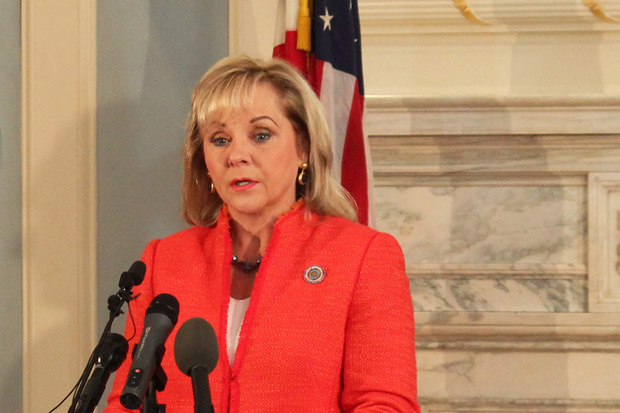
Gov. Mary Fallin at a state capitol press conference in Oklahoma City.
Joe Wertz / StateImpact Oklahoma


Gov. Mary Fallin at a state capitol press conference in Oklahoma City.
Joe Wertz / StateImpact Oklahoma

Joe Wertz / StateImpact Oklahoma
Gov. Mary Fallin at a state capitol press conference in Oklahoma City.
Gov. Mary Fallin on May 29 signed into law a bill preventing towns, cities and counties from banning hydraulic fracturing and other oil and gas activities.
Senate Bill 809 was one of several similarly worded bills filed during the 2015 legislative session. Many of the measures were fueled by a voter-approved fracking ban in Denton, Texas, just south of the state line, as well as municipal actions here in Oklahoma, where cities such as Norman and Stillwater were revising and rewriting local oil and gas ordinances.
Under the language of SB 809, authored by Senate President Pro Tempore Brian Bingman, R-Sapulpa, municipalities have the authority to enact local rules regulating oil and gas-related nuisances, such as noise, traffic and odors, provided such rules are “reasonable.”
Throughout the legislative session and discussion on the anti-frack ban legislation, state lawmakers noted the definition of “reasonable” is open to interpretation, and city officials warned of the potential for lengthy court challenges to any new oil and gas rules they enact.
The Oklahoma Municipal League opposed the bill. The organization’s executive director, Carolyn Stager, said local governments are most responsive to citizens’ concerns about localized oil and gas issues.
Capitol leadership, the energy industry and mineral owners, and the State Chamber supported the measure, which reaffirms the Oklahoma Corporation Commission as the state’s dominant oil and gas regulator. In a statement, Gov. Mary Fallin echoed a similar sentiment, writing that her signing of SB 809 preserves “a unified regulatory framework for the industry” and prevents “a confusing patchwork of inconsistent municipal regulations across the state.”
From Fallin’s statement:
“Corporation Commissioners are elected by the people of Oklahoma to regulate the oil and gas industry. They are best equipped to make decisions about drilling and its [effect] on seismic activity, the environment and other sensitive issues. We need to let these experts do their jobs. The alternative is to pursue a patchwork of regulations that, in some cases, could arbitrarily ban energy exploration and damage the state’s largest industry, largest employers and largest taxpayers.”